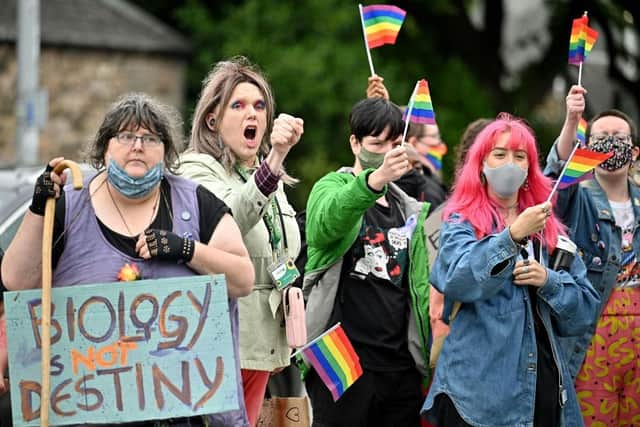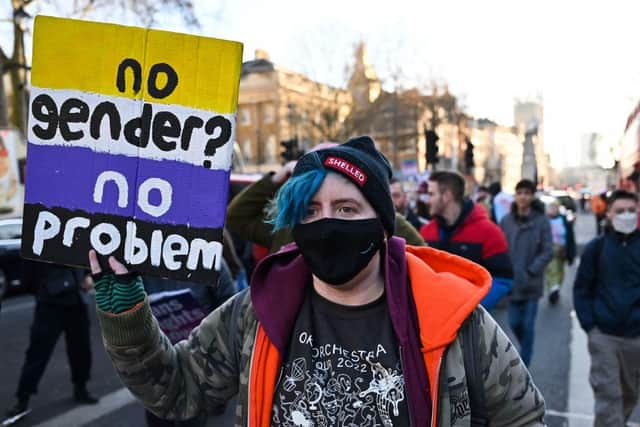Queen’s University orders every single person on campus to comply with transgender names and pronouns or face punishment
and live on Freeview channel 276
Specifically, the university's new code demands that both staff and students use whatever name and pronouns an individual demands.
Failure to do so is now treated as bullying and / or harassment.
Advertisement
Hide AdAdvertisement
Hide AdIt also applies to anyone who makes "derogatory" jokes about transgenderism.


This new code covers not just staff and students but anybody who sets foot on campus, including outside contractors like cleaners, caterers, and suppliers, and anyone hired by them.
This means if a building firm was hired to do repairs at Queen’s, and then hired a subcontractor to supply scaffolding, that subcontractor would be bound by the code of conduct too.
If, for example, this hypothetical scaffolder were then to encounter a 7ft tall, balding, bearded student who demanded to be referred to as a female, they would be under an obligation to accept that person’s declared gender identity without question, despite not even having signed a contract with Queen’s.
Advertisement
Hide AdAdvertisement
Hide AdThe News Letter recently learned that the university had updated its code of conduct on trans matters in January this year, replacing the old one which had been in place since 2016.


Details on that one here: Queen’s University equality policy is ‘open to abuse by those who want to silence others’
The university initially refused to give the News Letter a copy of the old code of conduct so it could be compared against the new one.
The News Letter responded that, under freedom of information laws, public bodies like Queen's cannot refuse such a request.
Advertisement
Hide AdAdvertisement
Hide AdIts press office then wrongly demanded that a special freedom-of-information-request be sent to a different department, which would consider it for up to a month before deciding if such information could be released.
Eventually, two weeks after the News Letter first asked for it, the press office relented and sent the old code of conduct.
Comparing old and new side-by-side shows a significant hardening of the language used by the university when regulating what people can and cannot say.
• THE OLD CODE •
The old policy contained a section headed "Trans respect guidelines".
Advertisement
Hide AdAdvertisement
Hide AdThese were "informal guidelines on how to treat people who are transitioning".
They included:
• "Think of the person as being the sex that they want you to think of them as."
• "Use the name and pronoun that the person asks you to.... If you make a mistake with pronouns, correct yourself and move on. Do not make a big deal out of it."
• "Respect people’s privacy. Do not ask what their ‘real’ or ‘birth’ name is."
Advertisement
Hide AdAdvertisement
Hide Ad• “A trans person should have access to ‘men-only’ and ‘women-only’ areas according to the gender in to which they identify. Ideally there should be access to gender neutral toilet facilities wherever this can be reasonably accommodated.”
The old code then went on to re-emphasise much the same points, saying: "Once a trans person has made known their preferred name, this name should be used in all circumstances, rather than their birth name(s).
"Also a person who identifies with a certain gender, whether or not they have had surgery, should be referred to using the pronoun they have a preference for (this could be 'he', 'she' or 'they')."
• THE NEW CODE •
The wording of the new code is quite different.
Gone is any reference to “informal guidelines”.
Instead the new code emphasises that the university has a "zero-tolerance approach to all bullying and harassment".
Advertisement
Hide AdAdvertisement
Hide Ad"Transphobic abuse, harassment or bullying (including name-calling / derogatory jokes / repeated or intentional use of incorrect pronouns or name) will be dealt with under the Bullying and Harassment Policy which states that the University will not tolerate such behaviour," the new code says (News Letter’s emphasis).
"It will be treated by the University as a disciplinary offence."
Taken literally, the above sentences mean that if somebody were to use “incorrect pronouns” on two or more occasions, even by accident, they would still fall foul of the code.
Similarly to the old “informal guidelines”, the new code states that people must be allowed into changing rooms and toilets “which they feel most comfortable using” – but the new code also adds that “all gender toilets are available in each of the University’s four campus sites and Queen’s is committed to continuing to roll out, where practicable, all gender toilet facilities”.
Advertisement
Hide AdAdvertisement
Hide AdWhen it comes to what people wear, the new code says "the University will support an individual’s choice of dress in connection with their gender identity and gender expression".
Whereas the old code was ambiguous about whether it applied to both staff and students, the new code explicitly says it applies to staff, students, job applicants, and prospective students, as well as "all visitors and anyone providing services to, or those contracted to work at, the University including sub-contractors".
A similar code is already in force in the Northern Ireland civil service: Use transgender pronouns or face possible dismissal say new guidelines for 23,000 civil servants
The university told the News Letter that the new code came into force "following further equality screening".
As to who adjudicates on and enforces it, Queen's said "disciplinary matters are implemented by senior managers".